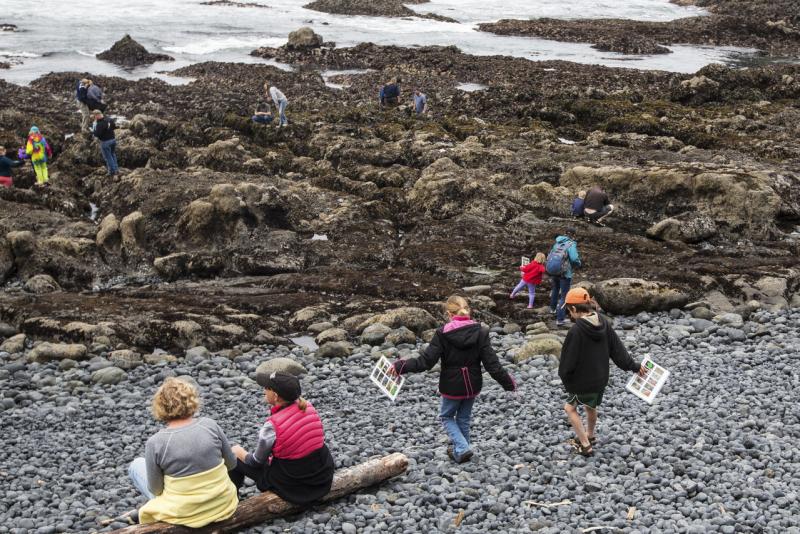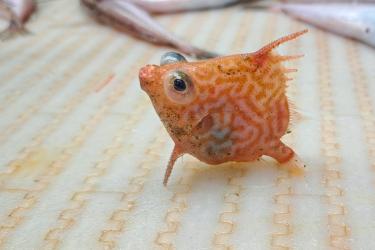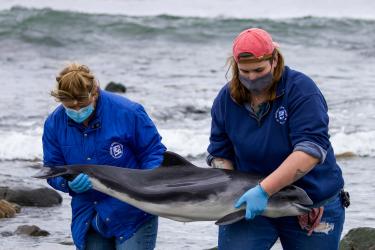NOAA and partners do a lot of work to conserve, protect, and restore habitat. We are increasing places for fish and wildlife to live, which benefits economies and communities. But, were you aware that habitat also helps improve our personal well-being, too?
We know restoring habitat creates jobs and stimulates the economy. Our studies show an average of 15 jobs per $1 million invested in habitat restoration. And, when they’ve been restored or they’re healthy to begin with, coastal and marine habitats have positive economic impacts because of commercial and recreational fisheries and tourism. In fact, more than 180 million Americans visit estuary and coastal waters each year for recreation and tourism. Additionally, habitat can help make communities more resilient, which can reduce economic impacts of storms and flooding.
Healthy habitat is valuable to us in other ways. More habitat means more opportunities to connect to nature to improve our mental and physical health and well-being. It can inspire us to conserve and protect our environment.
Habitat Improves Our Mental Wellness
Even just a little exposure to nature can improve our health and well-being. Studies show that having access to natural environments is good for us, and just two hours a week outside is associated with better well-being. A large and growing body of evidence shows that nature can reduce stress. Some studies even show time in nature can help kids with ADHD and improve symptoms of depression.
NOAA’s habitat work includes different types of projects and initiatives in or close to water. Water itself can impact our wellness in a positive way similar to the effects of nature. Positive associations exist between water, or “blue space,” and mental health. Who isn’t relaxed by seeing or even hearing the ocean’s waves or a river flowing?
Whether it’s habitat on land or in water, conserving, protecting, and restoring our environment means there can be more places for us to connect with nature to receive these helpful benefits.
We Can Play and Exercise in Habitat
More habitat means more places to recreate for our physical health. Kayaking, walking, swimming, and other activities all get us outside and moving. Whether you’re in rural or urban areas, there are many direct relationships between our physical health and getting out into nature.
Habitat Restoration Leads to Increased Recreational Opportunities
Some of our work restoring resources after pollution events directly leads to more recreation opportunities. The Qwuloolt Estuary restoration project in Washington State included a new trail as part of restoring impacts from a commercial and industrial waste landfill that contaminated areas nearby.
Other projects that conserve, protect, or restore habitat in waterways can indirectly create outdoor recreation opportunities. For example, a habitat improvement project in Michigan removed a dam to improve fish passage. This also opened up the river for paddling and other recreational activities.
Habitat Inspires Us to Care for the Environment
Experiencing nature makes us more connected to our surroundings and can help us understand why it’s important to conserve, protect, and restore the natural environment. Our time outside inspires wonder about what’s happening out in the world and what wildlife might live there. And when we have meaningful experiences out in nature, we’re more likely to want to help preserve it.
Many people on NOAA’s Habitat Conservation team have stories about what inspires them to commit to their work. Their commitment to conserving, protecting, and restoring habitat starts with an appreciation for the natural environment. That often stems from spending time on or in the water, whether it’s during their personal time or doing fieldwork in their studies or professional work.
Ultimately, when we get out into nature to benefit our happiness, health, and well-being, we’re also gaining a better appreciation for the environment. NOAA realizes this through trying to inspire a new generation to support marine conservation throughout the United States. Whether it’s our colleagues in other federal agencies like the National Park Service or nonprofit organizations like the Outdoor Foundation and the Children and Nature Network, there are no shortages of efforts encouraging people to get outside into healthy habitats.
In order for fish and wildlife, and humans, to continue to reap the rewards of habitat and nature, we’ll keep conserving it. When habitats are damaged or destroyed, the benefits to the environment, economies, and communities can be lost as well. We encourage you to connect and get involved. Learn more about the habitat around you—and to explore how it can help you be happier and healthier.





